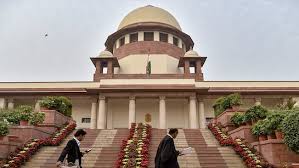SC suggestion to allow more IDs big win: Opposition on electoral roll revision

The Supreme Court has recently suggested allowing multiple forms of identity documents for voter registration and authentication, not just Aadhaar. This observation, made during a hearing, could reshape the way India conducts its elections. Opposition parties welcomed the move, calling it a step toward greater inclusion in democracy.
Making Democracy More Accessible
The court questioned why Aadhaar should be the only valid ID for voter verification. It suggested that other government-issued documents like PAN cards, passports, and driving licences could also serve the purpose. This simple recommendation holds the power to help millions.
Many people—especially migrant workers, tribal communities, and those without fixed homes—struggle to get or link Aadhaar. Technical issues, mismatched fingerprints, and complex procedures often block them. They lose their right to vote despite being eligible citizens.
By accepting more ID types, India can bring these marginalized voices back into the democratic system.
Opposition Parties Welcome the Move
The Congress and other parties in the INDIA bloc view the court’s suggestion as a win. They have long raised concerns over how Aadhaar was being used to remove voters from rolls. In several states, lakhs of names disappeared just before elections.
In 2018 and 2019, reports showed major deletions in states like Telangana and Karnataka. Many of these were linked to Aadhaar-based checks. Critics said the process lacked fairness and transparency.
Now, the court’s suggestion boosts the Opposition’s demand for fairer voter registration. A Congress leader said, “This gives hope to those wrongly removed from the voting list.”
Cleaning the Electoral Roll: Still a Controversy
The Election Commission regularly updates voter rolls. It removes names of people who have died or moved away. But the method used has often triggered concerns.
Opposition leaders say the deletion process has targeted poor and minority communities. Aadhaar-based verification, they argue, only made things worse. People faced deletion just because their biometric data didn’t match.
Allowing more ID options may fix some of these problems. It can help ensure that no one loses voting rights due to technical errors or missing documents.
What Could Change?
If the Election Commission accepts the court’s advice, here’s what might happen:
- More ID Choices: Voters could register using PAN cards, job cards, driving licences, or utility bills.
- Higher Registration Rates: Many who were left out may now find it easier to join the voter list.
- Fairer Voter Rolls: With more ID options, arbitrary deletions may become less frequent.
- Improved Trust: More people may believe in the fairness of the election system.
Challenges Ahead
Despite the support, putting this into action won’t be easy. The Election Commission would need to update its rules. Staff will need new training. And systems will have to support the change smoothly.
There may also be political resistance. The ruling party supports Aadhaar-based checks, saying it prevents fraud. They may argue that allowing many IDs could open the door to fake registrations.
The Commission must find a balance. It needs to stop fraud but also ensure no one is unfairly removed or blocked.
Impact on Future Elections
Several big elections are coming in the next few years. States go to polls in 2026, and the next Lok Sabha election is in 2029. If the changes come before then, the impact could be major.
Urban areas, where many people don’t have Aadhaar linked to their voter ID, could see big shifts. Migrants, students, and workers may now get to vote where they live.
Political experts say this could help parties that work closely with the grassroots. It may also reduce the advantage of deleting voters who support the Opposition.
Final Thoughts
The Supreme Court’s suggestion opens the door for a more inclusive voter registration process. Aadhaar has created barriers for many. Allowing more ID options can help fix that.
This isn’t just about documents. It’s about democracy. When more people vote, the system becomes stronger and more fair.
The next steps will matter. If the Election Commission acts soon, India could take a big leap toward better voter participation. Every citizen counts—and their vote should too.






